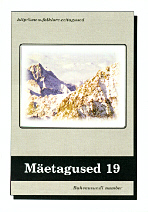Hääle semiootilised funktsioonid Siberi rahvaste folklooris ja uskumustes
The Semiotic Functions of Voice in the Folklore and Beliefs of Siberian Peoples
Author(s): Jelena NovikSubject(s): Customs / Folklore
Published by: Eesti Kirjandusmuuseum
Summary/Abstract: Non-verbal means of expression have great significance from the point of view of folklore. The voice, as an instrument of human semiotic behaviour has a special place among these. The article concerns systematisation of concepts of voice in Siberian oral tradition, highlighting its semiotic functions and observing their transformation due to some characteristics of archaic folklore. Voices of nature were identified and this led to giving semiotic meaning to natural sounds: a specific being was associated with the sound. Best known among the beliefs, omens and forecasts based on acoustic code is the complex connected with the "language" of fire - interpretation of the sounds of burning. The concept of the "language" of fire probably derives from the concept of a fire god or fairy. Sounds can also have a warning or forecasting nature. A number of omens and beliefs are based on the interpretation of animal sounds as the speech of animals. A common type of acoustic signs is imitation of the sounds of nature. The semantisation of sound in oral culture leads to voices of nature being valued and partly also acknowledged as 1) natural objects, 2) a concept that denotes a living being and life, and eventually as an expression of intent and opportunity to govern the other's behaviour. Many Siberian peoples believe that every person has his or her own song. Usually the statistical norms of the family or social group are relied upon in creating a song. There is a number of taboos concerning personal songs. Bear feasts are a good example on how the "voice of a soul" (a song or instrumental piece) becomes the the religious expression of the ancestor-guardian spirit and a means of establishing contact between it and the living descendants.
Journal: Mäetagused. Hüperajakiri
- Issue Year: 2002
- Issue No: 19
- Page Range: 105-124
- Page Count: 20
- Language: Estonian

